Imagine this: it’s pouring rain outside, and you hear a disconcerting rumble coming from your roof. You rush up to the attic, heart pounding, only to discover overflowing gutters threatening to cascade rainwater down your walls. Yikes!
Clogged or malfunctioning gutters can wreak havoc on your home’s foundation, fascia boards, and even the interior walls. But fear not, there’s a hero in this tale – the gutter machine.
What is a Gutter Machine?
A gutter machine is a metalworking marvel designed to transform pre-cut sheets of aluminum or steel into seamless lengths of gutter. Think of it as a high-tech metal origami master, precisely folding and shaping the flat sheets into the familiar U-shaped channels that hug your roofline.
Function of Gutter Machines
| Function | विवरण |
|---|---|
| Material Feeding | The machine feeds pre-cut sheets of metal (typically aluminum or steel) into the forming rollers. |
| रोल बनाना | A series of precisely contoured rollers bend and shape the metal into the desired gutter profile (K-style, half-round, etc.). |
| काट रहा है | An integrated cutting mechanism shears the formed gutter to a specific length. |
| Optional Features | Some machines offer features like beading (reinforcing the gutter edges) and hole punching (for drainage outlets). |
By utilizing a gutter machine, roofing professionals and even enthusiastic DIYers can create custom-sized gutters on-site, eliminating the need for pre-fabricated sections that might not perfectly match the roof’s dimensions.
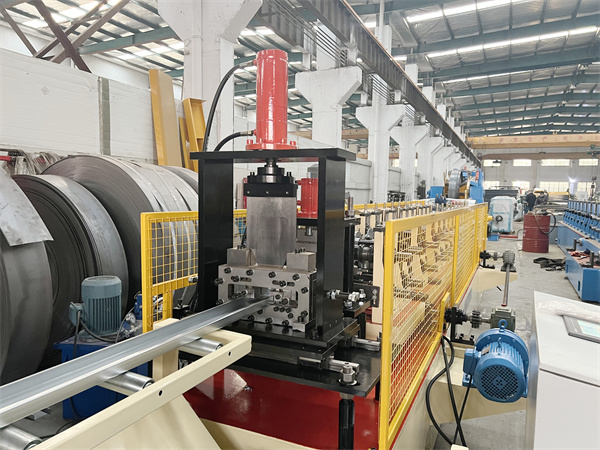
Types of Gutter Machines
Not all gutter machines are created equal. Here’s a breakdown of the two main categories:
- Residential Gutter Machines:
- Typically designed for lighter-gauge metals (aluminum) and smaller gutter profiles (K-style 5-inch or 6-inch).
- More compact and portable, making them ideal for smaller jobs or home use.
- Generally more affordable compared to commercial machines.
- Commercial Gutter Machines:
- Built for heavy-duty use with thicker gauge metals (steel) and a wider variety of profiles (including box gutters for industrial applications).
- Often sturdier and equipped with powerful motors for continuous operation.
- Can handle larger volumes of material, making them suitable for large-scale projects.
Applications of Gutter Machines
Gutter machines are the backbone of efficient gutter installation and replacement. They’re used in various scenarios:
- New Roof Construction: Roofing contractors can use gutter machines to create seamless gutters that perfectly match the roof’s dimensions and pitch.
- Gutter Replacement: When old gutters are damaged or clogged beyond repair, gutter machines allow for the creation of custom-sized replacements that seamlessly integrate with the existing roofline.
- Custom Gutter Needs: For unique architectural styles or oddly shaped rooflines, gutter machines offer the flexibility to fabricate gutters that fit precisely where pre-fabricated sections wouldn’t work.
Advantages of Gutter Machines
- Seamless Gutters: Eliminates unsightly seams and potential leak points present in pre-fabricated sections.
- Customizable Lengths: Creates gutters that perfectly match the exact length needed for the roofline, reducing waste.
- Material Versatility: Allows for the use of different materials like aluminum or steel, catering to specific strength and aesthetic requirements.
- On-Site Production: Provides the convenience of creating gutters on the job site, eliminating the need for pre-ordering and waiting for deliveries.
- Potential Cost Savings: Over time, the ability to create custom gutters on-site can translate to cost savings compared to relying solely on pre-fabricated options.
Disadvantages of Gutter Machines
- Learning Curve: Operating a gutter machine requires some practice and familiarity with the controls.
- Initial Investment: The upfront cost of a gutter machine can be significant, especially for commercial-grade models.
- Storage Space: These machines aren’t exactly compact, so dedicated storage space might be needed.
-
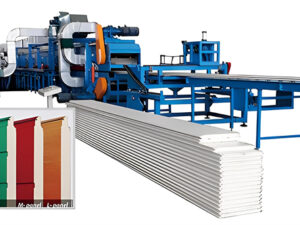 गेराज दरवाजा पैनल रोल बनाने की मशीन
गेराज दरवाजा पैनल रोल बनाने की मशीन -
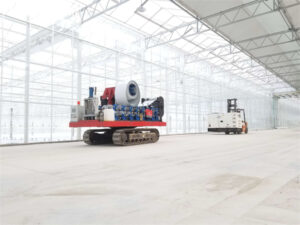 टैंक श्रृंखला के साथ ग्रीन आधुनिक कृषि गटर पैनल रोल बनाने की मशीन
टैंक श्रृंखला के साथ ग्रीन आधुनिक कृषि गटर पैनल रोल बनाने की मशीन -
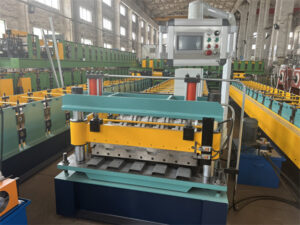 स्वचालित रूप से PPGI बाड़ पैनल के लिए रोल बनाने की मशीन चीन
स्वचालित रूप से PPGI बाड़ पैनल के लिए रोल बनाने की मशीन चीन -
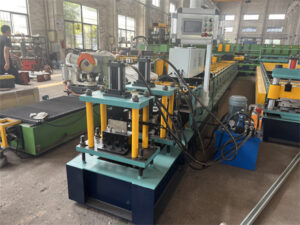 बाड़ गाइड रेल के लिए रोल बनाने की मशीन कंपनी
बाड़ गाइड रेल के लिए रोल बनाने की मशीन कंपनी -
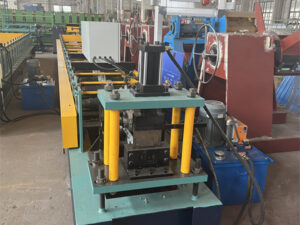 बाड़ पोस्ट गाइड रेल अच्छी कीमत के लिए रोल बनाने की मशीन की लागत
बाड़ पोस्ट गाइड रेल अच्छी कीमत के लिए रोल बनाने की मशीन की लागत -
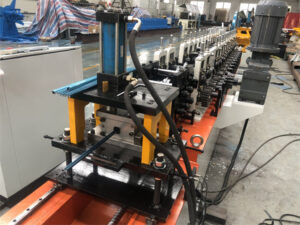 ग्लास विंडो सपोर्टर मशीन के लिए स्टेनलेस यू चैनल
ग्लास विंडो सपोर्टर मशीन के लिए स्टेनलेस यू चैनल -
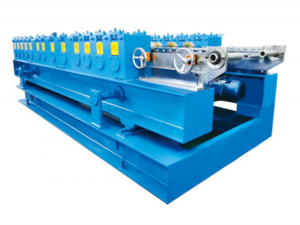 शटर बॉक्स सीरीज बनाने की मशीन
शटर बॉक्स सीरीज बनाने की मशीन -
 शामियाना ट्यूब रोल बनाने की मशीन
शामियाना ट्यूब रोल बनाने की मशीन -
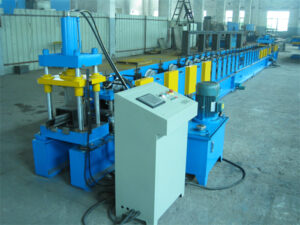 धातु दरवाजा फ्रेम रोल बनाने की मशीन डबल छूट
धातु दरवाजा फ्रेम रोल बनाने की मशीन डबल छूट
Choosing the Right Gutter Machine
The ideal gutter machine depends on your specific needs and budget. Here are some key factors to consider:
- Project Scope: For occasional DIY projects, a residential machine might suffice. For professional use with high volume, a commercial machine is recommended.
- Material Preference: If you plan on working primarily with aluminum, a residential machine might handle it well. Steel fabrication requires a more robust commercial machine.
Gutter Machine Options
Let’s delve deeper into the different gutter machine options available, highlighting their features and specifications to guide your selection process.
Residential Gutter Machines:
These machines are perfect for homeowners tackling gutter projects or smaller roofing contractors. Here’s a closer look at some popular choices:
- Roll forming machines: These are the most basic residential gutter machines. They typically handle lightweight aluminum sheets (0.025-0.032 inches) and form common profiles like K-style gutters in 5-inch or 6-inch sizes. While lacking fancy features, they’re a budget-friendly option for straightforward gutter production.
- Multi-function machines: These offer more versatility compared to basic roll forming machines. They might include features like beading (adding a reinforcing edge to the gutter) and hole punching for drainage outlets. Some models might also handle a slightly wider range of gutter profiles or slightly thicker aluminum gauges.
Here’s a table showcasing some popular residential gutter machines with their specifications:
| Brand | नमूना | Material Capacity | Profile Compatibility | Additional Features | Price Range (USD) |
|---|---|---|---|---|---|
| EasyRoll | EZ Roll Lite | 0.032″ Aluminum | K-style (5 & 6-inch) | – | $800 – $1,200 |
| RainWave | RG-2000 | 0.032″ Aluminum | K-style (5 & 6-inch), Half-Round | Beading | $1,200 – $1,500 |
| Gutter Pro | GP-Residential | 0.032″ Aluminum | K-style (5, 6 & 8-inch) | Beading, Hole Punching | $1,500 – $2,000 |
Commercial Gutter Machines:
For professional roofers or contractors dealing with high-volume projects, commercial gutter machines are the workhorses. They offer a significant upgrade in terms of:
- Durability: Built to withstand continuous use with heavy-duty materials like steel.
- Power: Equipped with more powerful motors for efficient and uninterrupted gutter production.
- Capacity: Can handle thicker gauge metals (up to 0.042″ steel) and a wider variety of gutter profiles, including box gutters used in industrial settings.
Here’s a table showcasing some popular commercial gutter machines with their specifications:
| Brand | नमूना | Material Capacity | Profile Compatibility | Additional Features | Price Range (USD) |
|---|---|---|---|---|---|
| Tenfold | Titan Pro | Up to 0.042″ Steel | K-style (various sizes), Half-Round, Box Gutters | Beading, Hole Punching, Automatic Cut-Off | $5,000 – $7,000 |
| DuraForm | DF-6000 | Up to 0.042″ Steel | K-style (various sizes), Half-Round, Fascia Profiles | Beading, Automatic Length Control | $7,000 – $9,000 |
| Mighty Machines | MMG-Industrial | Up to 1/8″ Steel | Customizable Profiles (including box gutters) | Heavy-Duty Construction, Digital Readout | $10,000+ |
Important Note: Prices listed are indicative and can vary depending on the retailer, features included, and current market conditions.
Beyond the Machine: Essential Gutter Machine Accessories
While the machine itself is the star of the show, some essential accessories can significantly enhance your gutter production experience:
- Uncoiler: This motorized spool unwinds the pre-cut metal sheet, feeding it smoothly into the gutter machine.
- Staker: Creates a small fold at the gutter’s bottom edge for added strength and stability.
- Downpipe Elbow Bender: Precisely bends downspout elbows at various angles for efficient drainage system installation.
- Safety Gloves and Goggles: Always prioritize safety when operating machinery. Wear proper gloves and eye protection to prevent injuries.
Considerations When Choosing Gutter Machine Accessories:
- Compatibility: Ensure the accessories you choose are compatible with your specific gutter machine model.
- Project Needs: Tailor your accessory selection to your gutter production requirements. If you plan on working with heavy gauge steel, a heavy-duty uncoiler is recommended.

पूछे जाने वाले प्रश्न
Q: How much does it cost to operate a gutter machine?
The operational cost of a gutter machine is relatively low. The primary expenses involve:
- Electricity: The machine’s motor consumes electricity, but the overall usage is typically moderate.
- Metal Coil Refills: The cost of the metal coil (aluminum or steel) depends on the material thickness, gauge, and current market prices.
- Optional Accessories: While not essential for basic operation, accessories like uncoilers and stakers can add to the overall cost.
Q: Where can I buy a gutter machine?
Gutter machines can be purchased from a variety of sources:
- Roofing Supply Stores: Many roofing supply stores carry a selection of residential and commercial gutter machines. The benefit here is the ability to see the machines firsthand and potentially get advice from knowledgeable salespeople.
- Online Retailers: Several online retailers offer gutter machines, with a wider selection compared to brick-and-mortar stores. However, you won’t be able to physically inspect the machine before purchase. Reading reviews and comparing specifications from different brands is crucial when buying online.
- Manufacturer Websites: Some gutter machine manufacturers sell directly through their websites. This can be a good option if you’ve already researched a specific brand and model.
Q: Do I need a permit to operate a gutter machine?
Permitting requirements can vary depending on your location. It’s always best to check with your local building department to determine if any permits are necessary for operating a gutter machine on a job site.
Q: How long does it take to learn how to operate a gutter machine?
The learning curve for operating a gutter machine depends on the complexity of the model. Residential machines with basic controls can be mastered relatively quickly by following the manufacturer’s instructions and practicing with scrap metal. Commercial machines with advanced features might require a bit more time to learn and become proficient in using all their functionalities.
Q: Can I rent a gutter machine instead of buying one?
Yes, some rental companies offer gutter machines, which can be a cost-effective option for occasional use. However, rental rates can vary, and it’s essential to factor in the cost of renting versus the potential long-term savings of owning a machine if you plan on tackling multiple gutter projects.
Q: How do I maintain a gutter machine?
Regular maintenance is crucial for ensuring the smooth operation and longevity of your gutter machine. Here are some key points:
- Cleaning: Regularly wipe down the machine’s exterior to remove dust and debris buildup.
- Lubrication: Refer to the manufacturer’s instructions for specific lubrication points and recommended lubricants.
- Blade Sharpening: Over time, the cutting blades might become dull. Sharpen or replace them as needed to maintain clean and precise gutter cuts.
- Storage: When not in use, store the machine in a clean, dry location to prevent rust and corrosion.
By following these simple maintenance practices, you can ensure your gutter machine remains a reliable companion for all your gutter fabrication needs.
